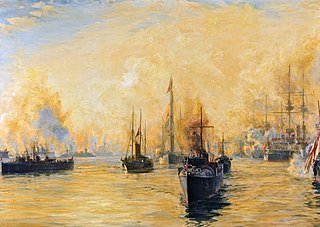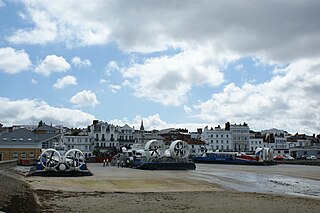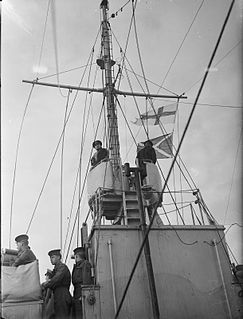Related Research Articles

PS Waverley is the last seagoing passenger-carrying paddle steamer in the world. Built in 1946, she sailed from Craigendoran on the Firth of Clyde to Arrochar on Loch Long until 1973. Bought by the Paddle Steamer Preservation Society (PSPS), she has been restored to her 1947 appearance and now operates passenger excursions around the British coast.

The PS Medway Queen is a paddle driven steamship, the only mobile estuary paddle steamer left in the United Kingdom. She was one of the "little ships of Dunkirk", making a record seven trips and rescuing 7,000 men in the evacuation of Dunkirk.

The Fairfield Shipbuilding and Engineering Company, Limited was a Scottish shipbuilding company in the Govan area on the Clyde in Glasgow. Fairfields, as it is often known, was a major warship builder, turning out many vessels for the Royal Navy and other navies through the First World War and the Second World War. It also built many transatlantic liners, including record-breaking ships for the Cunard Line and Canadian Pacific, such as the Blue Riband-winning sisters RMS Campania and RMS Lucania. At the other end of the scale, Fairfields built fast cross-channel mail steamers and ferries for locations around the world. These included ships for the Bosporus crossing in Istanbul and some of the early ships used by Thomas Cook for developing tourism on the River Nile.

HMY Alberta was a royal yacht of the Royal Navy of the United Kingdom. She was built by Pembroke Dock and launched in 1863.

William Denny and Brothers Limited, often referred to simply as Denny, was a Scottish shipbuilding company.

A & J Inglis, Ltd, was a shipbuilding firm founded by Anthony Inglis and his brother John, engineers and shipbuilders in Glasgow, Scotland in 1862. The firm built over 500 ships in a period of just over 100 years. Their Pointhouse Shipyard was at the confluence of the rivers Clyde and Kelvin. They constructed a wide range of ships, including Clyde steamers, paddle steamers and small ocean liners. In wartime, they built small warships, and in the period after World War II, they built a number of whalers.
The West Cornwall Steam Ship Company was established in 1870 to operate ferry services between Penzance, Cornwall, and the Isles of Scilly. It became the West Cornwall Steamship Company in 1907 and was wound up in 1917.
Two ships of the Royal Navy have borne the name HMS Solent, after the Solent, a stretch of water between the Isle of Wight and mainland England:

Island Harbour Marina, on the Isle of Wight, UK, is a commercial marina on the River Medina in the small hamlet of Binfield. It is located approximately halfway between Cowes and the County Town of Newport. Visiting yachtsmen will find it just past the Folly Inn on the East bank. Being a relatively small marina, it best suits pleasure craft of up to 20 metres in length. The marina accommodates both annual berthholders and short-term visiting craft.

PS Ryde is a paddle steamer that was commissioned and run by Southern Railway as a passenger ferry between mainland England and the Isle of Wight from 1937 to 1969, with an interlude during the Second World War where she served as a minesweeper and then an anti-aircraft ship, seeing action at D-Day. After many years abandoned on moorings at Island Harbour Marina on the River Medina, she was purchased by the PS Ryde Trust in late 2018, with the intention of raising money for her restoration. That project was abandoned in January 2019.

There are currently three different ferry companies that operate vessels carrying passengers and, on certain routes, vehicles across the Solent, the stretch of sea that separates the Isle of Wight from mainland England. These are Wightlink, Red Funnel and Hovertravel.
Five ships of the Royal Navy have borne the name HMS Tigris, after the river Tigris, in modern-day Iraq. Another was planned but never completed:
Duchess of Norfolk was a 381 GRT paddle steamer built in 1911 for the London, Brighton and South Coast Railway and London and South Western Railway, who operated a joint service to the Isle of Wight. She was requisitioned by the Royal Navy for use as minesweeper HMS Duchess of Norfolk during the First World War, returning to her owners after the war ended. She passed to the Southern Railway on 1 January 1923.

PS Pioneer was a Clyde-built paddle steamer launched in 1905, built by A. & J. Inglis at their Pointhouse shipyard for David MacBrayne. She served as a passenger and mail ship between the Kintyre peninsula and the islands Islay, Jura and Gigha for over thirty years. In 1939 she was moved to the Mallaig and Portree, Isle of Skye route, having been replaced by MV Lochiel.

DEPV Talisman was the world's first diesel-electric paddle vessel. Built in 1935, she was a passenger ferry on the Clyde, seeing wartime service as HMS Aristocrat. From 1953, she served for 14 years on the Millport station.

SS (RMS) Empress Queen was a steel paddle steamer, the last of its type ordered by the Isle of Man Steam Packet Company. She was chartered by the Admiralty in 1915 and used for trooping duties until she ran aground off Bembridge, Isle of Wight, England in 1916 and was abandoned.

This article describes the shipping services of the London and South Western Railway and the vessels employed.
The following index is provided as an overview of and topical guide to Wikipedia's articles on recreational dive sites. The level of coverage may vary:
PS Gracie Fields was a paddle steamer built in 1936 as a ferry and excursion steamer for Red Funnel of Southampton at the Thornycroft yard at Woolston. She ran on the Southampton-Cowes route until the outbreak of World War II, when she was requisitioned and served as HMS Gracie Fields as a minesweeper. After successfully evacuating troops from the Dunkirk beaches, she was seriously damaged by an aircraft bomb on 29 May 1940, and sank the following morning.

PS Princess Elizabeth is a passenger-carrying paddle steamer which was built by Day, Summers and Company in 1927 for Southampton, Isle of Wight and South of England Royal Mail Steam Packet Company Limited, that is noted for being one of the Little Ships of Dunkirk, and is now a static floating restaurant in Dunkirk.
References
- ↑ Habesch, David (2001). The Army's Navy : British Military Vessels and their History since Henry VIII. London: Chatham. p. 203. ISBN 1-86176-157-0.
- ↑ Colledge, J J. Ships of the Royal Navy: An Historical Index, Vol 1. Newton Abbot: David & Charles. p. 514.
- ↑ Haws, Duncan (1982). Royal Mail Line & Nelson Line. Crowborough: TCL Publications. pp. 39, 50. ISBN 0-946378-00-2.